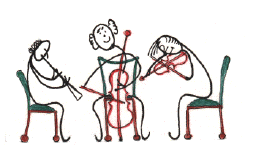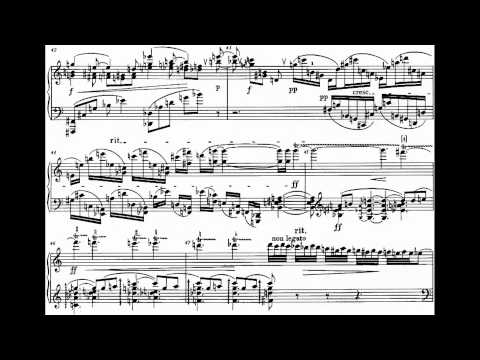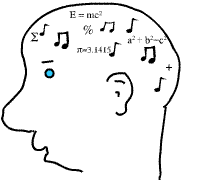What is musical analysis?? The answer to that question involves answering these questions: |
How does the music work? How is it constructed? What did the composer intend? What was
their purpose? |
Musical analysis is what you have to do to find out the answer to those questions. You make as many observations as you can. Look at the score, listen to the music. Look/listen for patterns. Draw conclusions where you can. Make educated guesses when you need to. Then communicate your findings to others. | 
|
OK, we have a definition, but who cares how the music works, how it is constructed, what the composer intended, what
their purpose was? |
Scholars care They may study the music to find out more about the style, the time period, the culture, the composer, the performance practice, the compositional technique, the acoustics, the instrumentation, the psychology of the music . . . well, you get the idea! |
 |
 |
Teachers care Those who teach music on any level will analyze music to answer many questions and make informed decisions. They may want to know the difficulty level of the piece, where the challenges will be, what instrumentation or voicing will be required, whether it will fit in a program, how long it will take to rehearse, how it will be perceived by an audience, what teaching objectives can be incorporated into rehearsals, and how to most effectively teach those objectives. |
Performers care They will analyze the music to find areas of emphasis (where their part should be emphasized or de-emphasized), where phrases are, so to shape them aesthetically. How the harmony should sound if playing with others. Interpretation of dynamics and articulation. Even where sections are for efficient rehearsal.. |
 |
 |
Conductors care Conductors study scores to determine themes to be emphasized, where phrases are, to put the piece into context for appropriate interpretation, areas of tension or resolution to be supported, and any other macro or micro points of analysis so
they will know how to conduct the piece to get the best sound. If the conductor is familiar with the composer's idioms and compositional style, score study and analysis are enriched. |
Listeners care Folks who love to listen to music find that the more they know about the music, the more they can appreciate it. When hearing a piece of music many times, a listener naturally begins to categorize, associate, and synthesize
their knowledge of that piece and relate to other music in
their listening repertoire. Understanding how the music fits together and what the composer had in mind is an added bonus to the enjoyment of music. |

|
Which are you? You are probably every one of the above! [ok, now don't tell me you're not a scholar - you're in grad school!] |
Analysis should involve an approach that allows us to hear and to understand music better. There are many approaches or techniques for analyzing music. Hence, analytical techniques. So, we are not just going to choose one way. It depends upon the music to be analyzed. Ever try using Roman numeral analysis on Schoenberg?? Be my guest. 
I think this one requires a different technique! So, when analyzing a piece of music, you choose your weapon!  -- which means that you are analyzing even before you know it in order to decide what method to use to analyze! 
The inherent difficulty in studying several different techniques is that we will only be hitting the highlights. Each one of these techniques would require extended periods of study (whole courses!) in order to do justice to the concepts and to gain adequate proficiency. But this is grad school. Our aim is to teach you how to keep learning. So, we will . . . |
| Analyze by listening |
 |
 |
Analyze by looking |
| See the small picture |
 |
 |
See the big picture |
| Use tools you already know |
 |
 |
Learn some entirely different tools |
| Analyze some familiar sounding music |
 |
 |
Analyze some very different types of music |
| Your final project for the class will be a complete analysis of an extended piece. Keep that in mind as we cover the different types of analytical techniques. You will get to choose (with my approval, of course!) the piece and the technique, so if something comes to mind, make a mental note.
However, do not choose a piece you have
previously analyzed in any course (even undergraduate).
That is not allowed according to the academic honesty
section in the syllabus. 
The way you will present your analysis will be in an analysis paper. Please read this article called Writing a Readable Analysis Paper All good advice except, in the section on General Tips, you should conform to APA style (remember, the devil is in the details). Where the author says, "it doesn't matter" - ignore that part! (remember, the devil is in the details). Where the author says, "it doesn't matter" - ignore that part! Analysis can be communicated in paragraph form (language and thick description) or through graphic representation (models, charts). Often, the best analyses contain both! 

Created and maintained by Vicky V. Johnson |